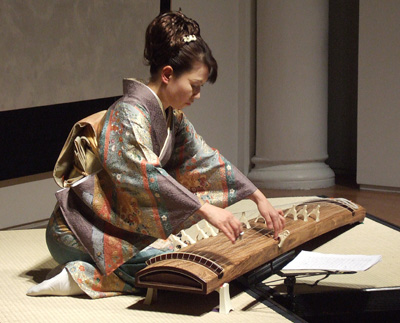By Stephen Brookes • The Washington Post • October 3, 2008
he pianist Kathryn Woodard has made a specialty of pushing music across cultural borders -- she was the first to play John Cage in darkest Kyrgyzstan, for instance. On Thursday night, she brought that intrepid spirit to the Freer Gallery's Meyer Auditorium, teaming up with the redoubtable koto player Masayo Ishigure and three other musicians to plumb the deep, shimmering currents of 20th-century Japanese music.
 Masayo IshigureContemporary Japanese composers have, for better or worse, been profoundly influenced by their European counterparts over the past hundred years, and the program opened a fascinating window on this rather one-sided fertilization.
Masayo IshigureContemporary Japanese composers have, for better or worse, been profoundly influenced by their European counterparts over the past hundred years, and the program opened a fascinating window on this rather one-sided fertilization.
Sometimes the results were harmless; Michio Miyagi's 1929 work, "The Sea in Spring" for koto and violin was a pretty, impressionistic work, distinctively Japanese both in musical language and overall contemplating-nature-by-moonlight esthetic approach. Other pieces, though, just seemed awkward; Kosaku Yamada's 1914 "Seven Poems" was a dutiful hodgepodge of borrowed styles (Scriabin, notably) picked up from his studies in Europe. And Maki Ishii's aggressively brainy "A Time of Afterglow" from 1983 was difficult to warm to (he studied serialism in Berlin in the 1960s, poor guy) despite a virtuosic and attentive performance by Ishigure with Theresa Salomon on violin.
But several works were nothing short of stunning. Salomon's violin swooped and circled over a measured piano line in Somei Satoh's mesmerizing "Birds in Warped Time II" from 1980, building an immense, cathedral-like effect from minimal gestures. Cellist James Wilson turned in a terrific account of Toshiro Mayuzumi's 1983 "Bunraku," a colorful, imaginative soliloquy streaked through with strange wit. But the most accomplished work of the evening was without doubt Toru Takemitsu's "Between Tides." It's as compelling and unfathomable as a dream, and the players brought it off with a perfect feel for its dark, elusive poetry.